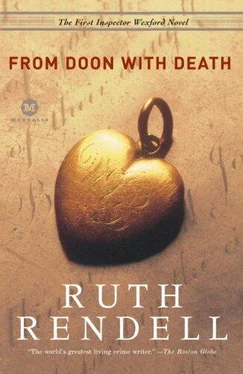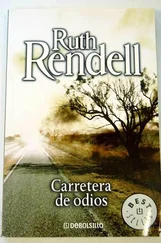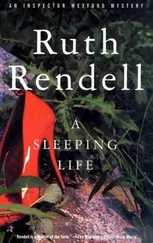Burden said he was most grateful.
‘Not at all. It’s no trouble,’ Miss Fowler said. ‘Honestly.’
The inquest was over in half an hour and Dr Crocker’s evidence occupied ten minutes of that time. Death, he said, was caused by strangulation by means of a ligature; a scarf possibly or a piece of cloth. Mrs Parsons’ body was otherwise unbruised and there had been no sexual assault. She had been a healthy woman, slightly overweight for her height. In his evidence Wexford gave his opinion that it was impossible to say whether or not there had been a struggle as the wood had been heavily trampled by Prewett’s cows. The doctor was recalled and said that he had found a few superficial scratches on the dead woman’s legs. These were so slight that he would not care to say whether they had been made before or after death.
A verdict was returned of murder by person or persons unknown.
Ronald Parsons had sat quietly throughout the inquest, twisting a handkerchief in his lap. He kept his head bowed as the coroner offered some perfunctory expressions of sympathy and indicated that he heard only by a slight movement, a tiny nod. He seemed so stunned with misery that Wexford was surprised when he caught up with him as he was crossing the flagged courtyard and touched him on the sleeve.
Without preamble he said, ‘A letter came for Margaret this morning.’
‘What d’you mean, a letter?’ Wexford stopped. He had seen some of Mrs Parsons’ letters: advertisements and coal bills.
‘From her cousin in the States,’ Parsons said. He took a deep breath and shivered in the warm sun.
Looking at him, Wexford realized that he was no longer stupefied. Some fresh bitterness was affecting him.
‘I opened it.’
He spoke with a kind of guilt. She was dead and they had plundered her possessions. Now even her letters, letters posthumously received, were to be picked over, their words dissected as meticulously as her own body had been examined and exposed.
‘I don’t know… I can’t think,’ he said, ‘But there’s something in it about someone called Doon.’
‘Have you got it with you?’ Wexford asked sharply.
‘In my pocket.’
‘We’ll go into my office.’
If Parsons noticed his wife’s books spread about the room he gave no sign. He sat down and handed an envelope to Wexford. On the flap, just beneath the ragged slit Parsons had made, was a handwritten address: From Mrs Wilbur S. Katz, 1183 Sunflower Park, Slate City, Colorado, U.S.A.
‘That would be Miss Anne Ives,’ Wexford said. ‘Did your wife correspond with her regularly?’
Parsons looked surprised at the name.
‘Not to say regularly,’ he said. ‘She’d write once or twice a year. I’ve never met Mrs Katz.’
‘Did your wife write to her recently, since you came here?’
‘I wouldn’t know, Chief Inspector. To tell you the truth, I didn’t care for what I knew of Mrs Katz. She used to write and tell Margaret all about the things she’d got - cars, washing machines, that sort of thing … I don’t know whether it upset Margaret. She’d been very fond of her cousin and she never said she minded hearing about all those things. But I made it plain what I thought and she stopped showing me the letters.’
‘Mr Parsons, I understand Mrs Ives’ house was left jointly to your wife and Mrs Katz. Surely-?’
Parsons interrupted bitterly: ‘We bought our share off her, Chief Inspector. Every penny of seven hundred pounds we paid - through a bank in London. My wife had to work full-time so that we could do it, and when we’d paid the lot, just paid off the lot, the council bought the place off us for nine hundred. They had a sort of order.’
‘A compulsory-purchase order,’ Wexford said. ‘I see’ He stuck his head round the door. ‘Sergeant Camb! Tea, please, and an extra cup. ‘I’ll just read that letter, if you don’t mind, Mr Parsons.’
It was written on thin blue paper and Mrs Katz had found plenty to tell her cousin. The first two pages were entirely taken up with an account of a holiday Mr and Mrs Katz and their three children had spent in Florida; Mrs Katz’s new car; a barbecue her husband had bought her. Mr and Mrs Parsons were invited to come to Slate City for a holiday. Wexford began to see what Parsons had meant.
The last page was more interesting.
Gee, Meg (Mrs Katz had written), I sure was amazed to see you and Ron had moved to Kingsmarkham. I’ll bet that was Ron’s idea, not yours.
And you have met up with Doon again, have you? I sure would like to know who Doon is. You’ve got to tell me, not keep dropping hints.
Still, I can’t see why you should be scared of Doon. What of, for the Lord’s sake? There was never anything in that. (You know what I mean, Meg.)
I can’t believe Doon is still keen. You always had a suspicious mind!!! But if meeting Doon means trips in the car and a few free meals I wouldn’t be too scrupulous.
When are you and Ron going to get a car of your own? Wil says he just doesn’t know how you make out…
There was some more in the same vein, sprinkled with exclamation marks and heavily underlined. The letter ended:
… Regards to Ron and remind him there’s a big welcome waiting for you both in Sunflower Park whenever you feel like hitting Colorado, U.S.A.
Love from Nan. Greg, Joanna and Kim send hugs to their Auntie Meg.
‘This could be very important, Mr Parsons,’ Wexford said. ‘I’d like to hang on to it.’
Parsons got up, leaving his tea untasted.
‘I wish it hadn’t come,’ he said. ‘I wanted to remember Margaret as I knew her. I thought she was different. Now I know she was just like the rest, carrying on with another man for what she could get out of him.’
Wexford said quietly: ‘I’m afraid it looks like that. Tell me, didn’t you have any idea that your wife might be going out with this man, this Doon? It looks very much as if Doon knew her when she lived in Flagford and took up with her again when she came back. She must have gone to school here, Mr Parsons. Didn’t you know that?’
Did Parsons look furtive, or was it just a desire to hold on to some remnants of his private life, his marriage broken both by infidelity and by death, that made him flush and fidget?
‘She wasn’t happy in Hagford. She didn’t want to talk about it and I stopped asking her. I reckon it was because they were such a lot of snobs. I respected her reticence, Chief Inspector.’
‘Did she talk to you about her boy friends?’
‘That was a closed book,’ Parsons said, ‘a closed book for both of us. I didn’t want to know, you see.’ He walked to the window and peered out as if it was night instead of bright day. ‘We weren’t those kind of people. We weren’t the kind of people who have love affairs.’ He stopped,
remembering the letter. ‘I can’t believe it I can’t believe that of Margaret. She was a good woman. Chief Inspector, a good loving woman. I can’t help thinking that Katz woman was making up a lot of things that just weren’t true, making them up out of her own head.’
‘We shall know a bit more when we hear from Colorado,’ Wexford said. ‘I’m hoping to get hold of the last letter your wife wrote to Mrs Katz. There’s no reason why it shouldn’t be made available to you.’
‘Thank you for nothing,’ Parsons said. He hesitated, touched the green cover of Swinburne’s verses and walked quickly from the room.
It was some sort of a break, Wexford thought, some sort of a break at last. He picked up the telephone and told the switchboard girl he wanted to make a call to the United States. This had been a strange woman, he reflected as he waited, a strange secretive woman leading a double life. To her husband and the unobservant world she had been a sensible prudent housewife in sandals and a cotton frock, an infants’ teacher who polished the front step with Brasso and went to church socials. But someone, someone generous and romantic and passionate, had been tantalized and maddened by her for twelve long years.
Читать дальше











